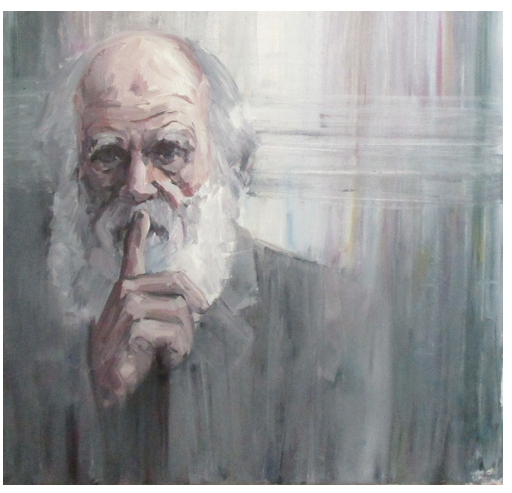-
 PoeticUniverse
1.7ktheoretically & statistically probable — Gnomon
PoeticUniverse
1.7ktheoretically & statistically probable — Gnomon
From quantum non-locality entanglement,
We know that information’s primary
Over distance, that objects don’t have to
Be near each other to have relation.
Everything connected to everything
Would seem to be a ‘perception’ as an
All-at-onceness, so a particle
Might ‘know’ something about what to do.
Informationally derived meanings
Unify in non-reductive gleanings,
In a relational reality,
Through the semantical life happenings.
This is a realm of happenings, not things,
For ‘things’ don’t remain the same on time’s wings.
What remains through time are processes—
Relations between different systems.
Syntactical information exchange,
Without breaking of the holistic range,
Reveals the epic whole of nature’s poetics,
Within her requisite of ongoing change.
So there’s form before gloried substance,
Relationality before the chance
Of material impressions rising,
Traced in our world from the gestalt’s dance.
All lives in the multi–dimensional spaces
Of basic superpositional traces
Of Possibility, as like the whirl’s
Probable clouds of distributed paces. -
 Gnomon
4.4k
Gnomon
4.4k
Yes. A statistical relationship is not spatial, or quantitative, but informative & qualitative. For example, a mathematical Ratio compares abstract values to determine how far they are from equality. Even Gravity is not spooky action at a distance, as Newton assumed. It's a relative & proportional Ratio between physical objects. Ratios are not real and physical. They are ideal and mental. However, abstract Ratios can be causal in the sense of Constructive Absence. :smile:From quantum non-locality entanglement,
We know that information’s primary
Over distance, that objects don’t have to
Be near each other to have relation. — PoeticUniverse
PS__A statistical state is not a place in physical space, but in abstract possibility Space. -
 Gnomon
4.4k
Gnomon
4.4k
Speaking of evolutionary emergence, Charles Darwin touched on the notion of FreeWill in his The Descent of Man. In a Philosophy Now article, Samuel Grove, author of Retrieving Darwin's Revolutionary Idea, said that "Darwin was fascinated by the problem of free will". Then, he mused, "What does this mean in practical terms? . . . . Darwin's hunch was that it was intimately related to the variation in nature". But I would suggest that the freethought of upright apes is a function of both Random Variation to produce novel forms, and of Positive Selection criteria to allow only the best models to proceed into the next generation. This results in complexification and organization, which some of us view as progression."Speaking of "Emergence" and other mysterious appearances". — 180 Proof
Grove noted that "Darwin also faced a couple of philosophical paradoxes in applying natural selection to man" The first conundrum was, "how natural selection -- which was a history of errors, faults, failures, and fallacies -- could give rise to a person capable of self-knowledge and truth". We now see that a product of that heuristic (trial & error) process is the self-aware descendant of those knuckle-walking nit-picking apes. But Darwin already had the right idea; he just failed to see how the combination of randomness and selectiveness could be creative and progressive.
Ironically, these imaginative sky-walkers have just placed their own technological creation into a stable orbit a million miles from its origin. Although a product of intentional algorithms, it was also the end result of many trials & errors. This golden-eye-in-the-sky should be able to look back into cosmic history to see what the universe looked like billions of years before animated creatures emerged from that seemingly wasteful procedure of making zillions of mistakes, but selecting only a few of the best to make newer & better errors. This illustrates how fecundity and selectivity can result in a means for the meandering cosmos to become self-aware.
Therefore we have evidence to show that a combination of variation & selection can solve the first paradox of free will : by inadvertently producing self-conscious creatures. But that leads to the second paradox : how could blind groping Nature create the global organism of self-directed Culture? Darwin admitted that "nature's productions . . . . plainly bear the stamp of far higher workmanship". Grove noted that we could define human Culture & Civilization as "consciously-directed evolution". He said, "ironically, the very fact that natural selection does apply to us means we can't apply it to us, or it would cease to be Natural . . . . This is the paradox. This was the essence of Darwin's dilemma." Somehow, conscious Artificial selection & evolution has emerged from a program of unconscious Natural reproduction & progression. :nerd:
Shhhhh! DON'T TELL ANYONE I COULDN'T EXPLAIN
THE EMERGENCE OF FREEWILL
Welcome to The Philosophy Forum!
Get involved in philosophical discussions about knowledge, truth, language, consciousness, science, politics, religion, logic and mathematics, art, history, and lots more. No ads, no clutter, and very little agreement — just fascinating conversations.
Categories
- Guest category
- Phil. Writing Challenge - June 2025
- The Lounge
- General Philosophy
- Metaphysics & Epistemology
- Philosophy of Mind
- Ethics
- Political Philosophy
- Philosophy of Art
- Logic & Philosophy of Mathematics
- Philosophy of Religion
- Philosophy of Science
- Philosophy of Language
- Interesting Stuff
- Politics and Current Affairs
- Humanities and Social Sciences
- Science and Technology
- Non-English Discussion
- German Discussion
- Spanish Discussion
- Learning Centre
- Resources
- Books and Papers
- Reading groups
- Questions
- Guest Speakers
- David Pearce
- Massimo Pigliucci
- Debates
- Debate Proposals
- Debate Discussion
- Feedback
- Article submissions
- About TPF
- Help
More Discussions
- Other sites we like
- Social media
- Terms of Service
- Sign In
- Created with PlushForums
- © 2026 The Philosophy Forum



